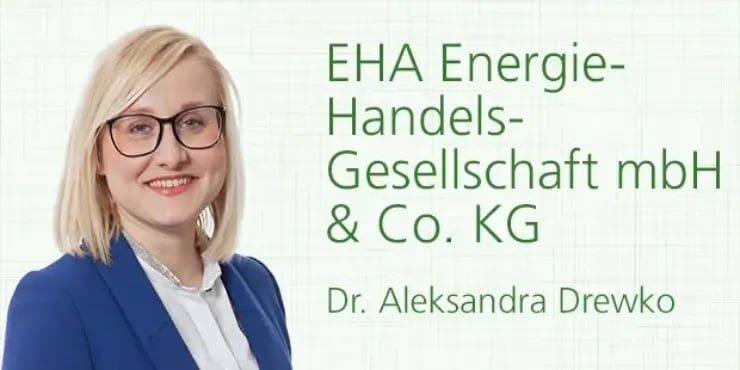Dr. Aleksandra Drewko ist Beraterin der EHA Energie-Handels-Gesellschaft mbH & Co. KG. EHA ist ein deutscher Energiedienstleister und eine Tochter der REWE Group. Die Kunden erhalten „aus einer Hand“ ein umfangreiches Paket von Dienstleistungen. Dazu zählen die Beschaffung und Lieferung von Grünstrom und Gas, Energiecontrolling und Energieberatung. Das Ergebnis sind nachhaltige Verbrauchs- und Kostenreduzierungen sowie praktizierter Klimaschutz.
Frau Drewko ist Expertin für die Themen Klimaschutzstrategien für Unternehmen, CO2-Bilanzierung und Maßnahmen zur Reduktion von Emissionen. Im Interview gibt sie exklusive Einblicke in ihre Arbeit.
Fr. Dr. Drewko, EHA beschäftigt sich schon lange mit dem Thema Klimabilanzen. Was sind die Gründe dafür?
Der bewegende Grund, warum wir uns mit diesem Thema schon so lange beschäftigen, sind die Ressourceneinsparungen, die wir nicht nur bei uns, sondern auch bei unseren Kunden erreichen können. Wir betrachten eine Klimabilanz als eine Hot-Spot-Analyse und ein ausgesprochen nützliches Instrument, um die eigenen Prozesse und Ressourcen in den Griff zu bekommen. Im Rahmen einer Klimabilanz analysieren wir gemeinsam mit unseren Kunden, in welchen Bereichen es noch Optimierungspotenziale gibt und wie viel Geld sie dabei einsparen können. Wir haben gelernt, dass monetäre Einsparungen auch Klimaschutzskeptiker überzeugen. So schaffen wir eine Win-Win-Situation: Für das Klima und den Geldbeutel unserer Kunden.
Was war das spannendste Carbon Footprint Projekt bei der EHA?
Es war ohne Zweifel die Bestimmung des Carbon Footprints des ersten klimaneutralen Girokontos Deutschlands der Sparda-Bank Hamburg eG.
Können Sie Ihre Vorgehensweise bei der CO2-Bilanzierung in diesem Projekt beschreiben?
Der erste Schritt war die Systemgrenze zu bestimmen, d.h. wofür genau der Carbon Footprint berechnet wird. Deswegen haben wir alle mit dem Girokonto verbundenen Prozesse, Aktivitäten sowie Akteure aufgelistet und nach ihrer Relevanz bewertet. Dabei haben wir die Abläufe, die bei der Bank, den Partnerunternehmen, Dienstleistern der Bank sowie Kunden stattfinden, unter die Lupe genommen. Erst danach haben wir mit der Datenerhebung angefangen.
Wir mussten uns solche Fragen stellen, wie z. B. wie werden Emissionen aus der Datenübertragung während der Nutzung des Online-Bankings berechnet. Zur Bestimmung, wie viel Strom ein PC, Notebook, Smartphone, Router oder Drucker verbraucht, d. h. alle Geräte, die zur Erbringung der Dienstleistung oder zu deren Nutzung verwendet werden, haben wir Messungen durchgeführt. Danach habe ich alle relevanten Prozesse in Umberto modelliert und schließlich die Emissionen pro Girokonto und Vertragsjahr bestimmt.
Welche Herausforderungen haben sich dabei gestellt?
Die Erstellung von Carbon Footprint im Bereich der Dienstleistungen bis auf Paketzustellungsdienste und Druckverfahren ist ein neues Feld. Das macht es auch schwierig, weil es wenig gibt, woran man anknüpfen bzw. womit man vergleichen kann.
Die größte Herausforderung bei diesem Projekt bestand allerdings in der Festlegung der Systemgrenze. Für einige Prozesse mussten wir erst die Emissionen abschätzen, um dann feststellen zu können, ob sie relevant sind. Eine weitere Herausforderung war, notwendige Daten zu bekommen. Bei einigen Angaben, die z. B. nicht von uns gemessen werden konnten, mussten wir mit Literaturwerten arbeiten. Ein wichtiger Punkt war auch, die richtigen Emissionsfaktoren auszuwählen.
Was würden Sie Unternehmen, die neu mit der Betrachtung von Carbon Footprints beginnen, raten?
Die erste und wichtigste Phase eines Projektes ist die Festlegung der Systemgrenze, d. h. die genaue Bestimmung, wofür Sie den Carbon Footprint berechnen möchten. Für mich war es hilfreich, eine Mindmap zu skizzieren und die Prozesse zusammen mit den einzelnen Aktivitäten dem jeweiligen Akteur zuzuordnen. Auch wenn es kompliziert und mühsam ist, rate ich Ihnen diesen Schritt ordentlich zu machen. Danach empfehle ich Ihnen, ein Datenkonzept zu erstellen, d. h. bestimmen, wo Sie welche Daten bekommen können. Erschrecken Sie nicht, auch wenn es am Anfang schwierig scheint. Nach der Konzeptphase werden Sie sicherlich viel Spaß dabei haben, den Carbon Footprint zu berechnen.
Vielen Dank Fr. Dr. Drewko!
Mehr Informationen zur EHA finden Sie hier.






